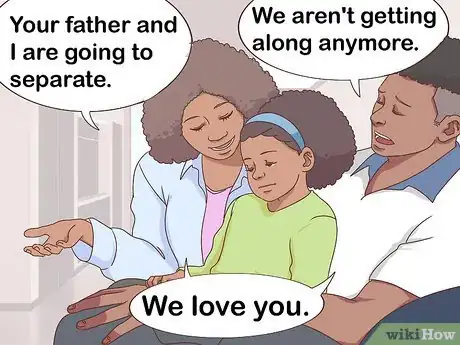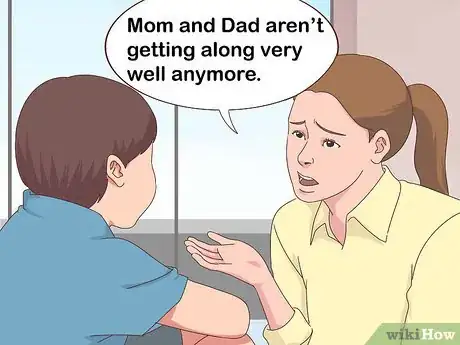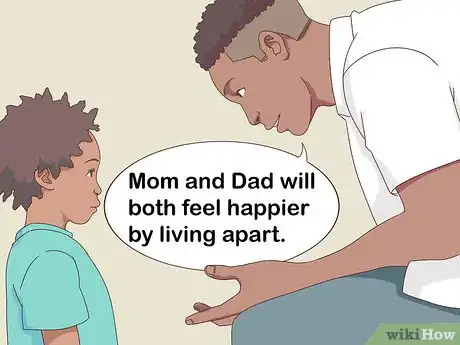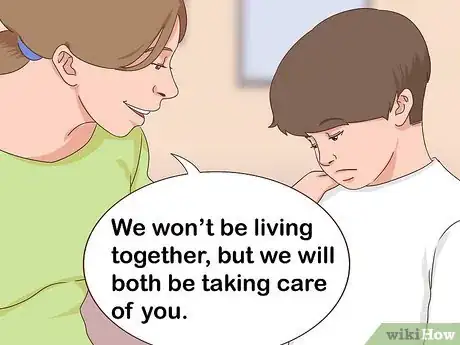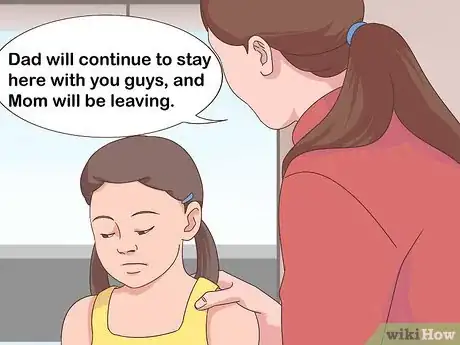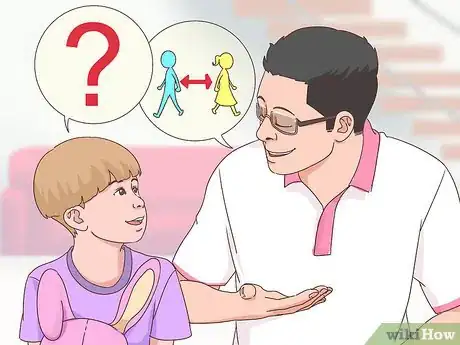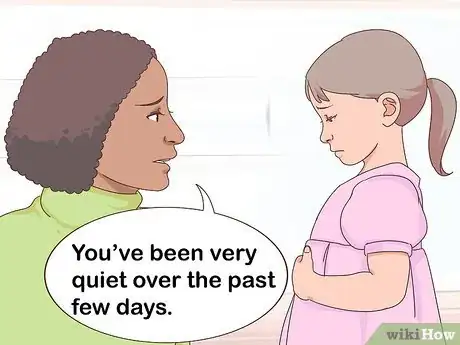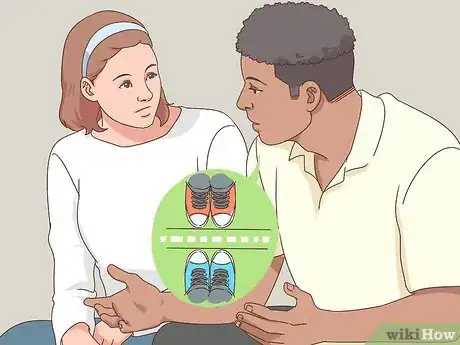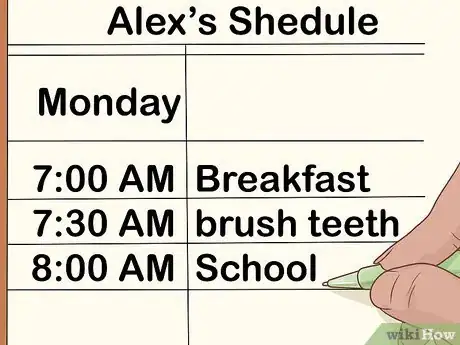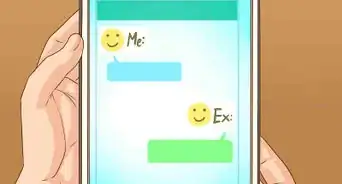This article was co-authored by Klare Heston, LCSW. Klare Heston is a Licensed Independent Clinical Social Worker based in Cleveland, Ohio. With experience in academic counseling and clinical supervision, Klare received her Master of Social Work from the Virginia Commonwealth University in 1983. She also holds a 2-Year Post-Graduate Certificate from the Gestalt Institute of Cleveland, as well as certification in Family Therapy, Supervision, Mediation, and Trauma Recovery and Treatment (EMDR).
This article has been viewed 73,240 times.
Going through a separation is typically a stressful, emotional time. Matters are sometimes complicated when kids are in the picture. As a parent, you might struggle with how to break the news to your kid, or even what you should say. Effectively discuss this difficult topic with your child by preparing in advance, explaining the separation in direct but brief words, and assisting them with the transition.
Steps
Preparing for the Talk
-
1Gain control of your emotions first. If your spouse just recently broke the news of a separation to you, or you are still coming to terms with the decision, you should probably wait before talking to the kids. You’ll want to be able to emotionally support your kids, depending on their reaction. Doing so will be a challenge if you’re still a wreck yourself.[1]
- Ask for some time and/or space before having the talk. You might say, “Is it okay if you give me a week before we tell the kids? I need to wrap my head around this first.”
- In the meantime, lean on friends and family. Be gentle with yourself as you come to terms with the separation.
-
2Get on the same page. Both parents should present as a united front. Therefore, you need to be clear about what you’re telling the kids. Have a discussion beforehand about the details. Once the two of you have agreed on what you’ll say, stick to the script.
- For instance, you might say, "Your father and I are going to separate." Your spouse can follow up by saying, "We aren't getting along anymore." Then, echo one another by both letting the child know, "We love you."
Advertisement -
3Plan to do it together. It will be confusing if you break the news to the children on your own. They need to see you and your spouse working together as a reminder that you are both still their parents. That much, at least, hasn’t changed. Coordinate with your spouse on a time and place to schedule the talk.[2]
- Pick a time when you’re both free and relatively relaxed. Clear the remainder of your day or evening, so you can offer reassurance or support to the children as needed.
- Also, if the separation isn’t happening for some time, you might choose to delay the discussion until closer to the planned date. Otherwise, the children might become confused and think it’s no longer happening.
- If one of the parents is unable or unwilling to participate in this conversation, try to remain as objective as possible. Do not badmouth the other parent. Just stick to the facts.
Explaining the Situation
-
1Be straightforward and brief. Talking about separation is not a fun subject, but get to the point rather than trying to dress up the discussion. You might say something like “Mom and Dad aren’t getting along very well anymore. We’ll be taking some time apart and living separately.”[3]
- Offer a soft and empathetic tone as you deliver the news. Don’t be defensive or accusatory about your spouse, either.
-
2Keep the details to a minimum. Even if there has been obvious tension in your marriage, your kids don’t need to know all the ugly details. Simply say what you need to say and keep the focus on them, not on you.[4]
- For instance, it would be entirely inappropriate to mention cheating, abuse, or financial troubles. It will only complicate matters if you introduce your children to adult problems.
- Instead of going into complex details, keep it short and simple. Say, "Mom and Dad will both feel happier by living apart."
-
3Be reassuring. Kids may react to the news of divorce in many different ways. Your role should be to reassure them that, although things are changing in your marriage and household, your parenting role stays the same. Both parents should convey that you love your children and will be there for them as best you can.[5]
- For instance, remind them “This is happening because we can’t get along. You did nothing wrong. We love you and we always will. We won’t be living together, but we will both be taking care of you.”
-
4Describe how it will affect them logistically. Most children will immediately wonder about how a separation impacts their lives, so address this as soon as possible. Give them some basic information about how their lives will change due to this new reality.[6]
- For example, you might say, “Dad will continue to stay here with you guys, and Mom will be leaving. I’ll be getting an apartment nearby and you will spend weekends with me.”
-
5Answer questions honestly but age-appropriately. Your child may suggest reasons they think you are splitting. To enhance their trust, don’t lie. Don’t go into details either. Agree that the suggested behavior is a part of the problem, but that there are other issues as well. Make sure you keep any explanations appropriate for your child’s age.[7]
- For instance, younger children of preschool age may think, because one parent is leaving, that they are leaving them, not the other parent. Correct these misconceptions and reassure them it’s not their fault.
- Older children may have fantasies of getting their parents back together. You might validate their intentions, but let them know that these decisions are out of their control.
- Your child may have ideas of who they want to live with, but you should explain that there are other factors in this decision. Try to stick to the custody plan that both parents have developed together.
Helping Them Adjust to the New Reality
-
1Encourage them to talk about their feelings. Invite a discussion (both during and after the initial talk) about what your children are thinking and feeling in response to the news. Keep in mind that this will not be one single conversation, but rather an ongoing discussion.[8]
- You might say to one child, “You’ve been very quiet over the past few days. I can imagine that this is all very confusing. I want you to know that you can talk about what you’re feeling. I’m here to listen.”
-
2Keep them out of the marital squabbles. Although you might approach the initial conversation as a unified front, it’s easy to drop your guard and start pulling the children into conflict. Avoid this by setting clear boundaries with your spouse. Agree to not discuss one another with the children, or question what’s happening in the other’s household.[9]
- Keep contact to a minimal when dropping off and picking up. Resist the urge to send messages through the kids. Communicate through written messages like an email or a text message.
-
3Maintain their schedule. The reality of a separation can be a lot to handle as a child. Try your best to maintain some semblance of normalcy by keeping to the kid’s usual routines as much as possible. Try to follow the same homework and bedtime schedule across households. And, set the same (or similar) limits and guidelines.[10]
-
4Consider family therapy. Coping with a separation can be hard for all involved. It may be wise to seek the support and guidance of a marriage and family therapist during this time. Such a professional can offer emotional support to the parents and the children. They can also offer direction about how to navigate your new reality.
- Don't be afraid to ask your therapist any questions you may have. They can also give you feedback on your plans for custody, visitation, and life after separation.
References
- ↑ http://www.huffingtonpost.com/michelle-rozen/telling-children-about-divorce_b_3351936.html
- ↑ http://www.evansfamilylawgroup.com/wp-content/uploads/2011/12/Telling-the-Kids-about-Separation-and-Divorce.pdf
- ↑ https://www.helpguide.org/articles/family-divorce/children-and-divorce.htm
- ↑ http://www.huffingtonpost.com/michelle-rozen/telling-children-about-divorce_b_3351936.html
- ↑ https://www.helpguide.org/articles/family-divorce/children-and-divorce.htm
- ↑ http://www.evansfamilylawgroup.com/wp-content/uploads/2011/12/Telling-the-Kids-about-Separation-and-Divorce.pdf
- ↑ https://www.todaysparent.com/family/kids-and-divorce-an-age-by-age-guide/
- ↑ http://www.lianalowenstein.com/explaining_separation_divorce.pdf
- ↑ https://www.todaysparent.com/family/kids-and-divorce-an-age-by-age-guide/
About This Article
Telling your child you’re separating can be a difficult conversation, but if you plan ahead and reassure them, it’ll be a bit easier. If the news is still fresh to you, take a few days to come to terms with your separation before telling your child. Decide with your partner what you’re going to tell them, like the reason why you’re separating and what the new living arrangements will be. That way, you can minimize any confusion your child might feel. Tell your child together so you can both be there for them. Once you’ve broken the news, reassure them that you love them and that you’ll both take care of them. However, avoid going into details about what went wrong in your relationship. If in doubt, just say, “We’re not getting along well anymore, so we decided it’s best to separate.” For more tips from our co-author, including how to help your child adjust to their new reality, read on.

